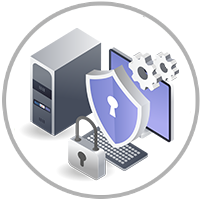Stay Ahead of Cyberthreats
Cybercriminals often exploit emergencies to launch attacks, here are some reminders of things to look for during an emergency situation:
- Phishing Emails: Be cautious of emails claiming to need data or information from us or offering hurricane updates or assistance. These emails may contain malicious links or attachments. Verify the sender is legitimate before clicking on any links.
- Spoofed Communications: Scammers might impersonate utility workers, calling or messaging customers to solicit sensitive information, often claiming they need it for service restoration.
- Social Media Misinformation: Before sharing or reacting to posts regarding emergency responses, safety measures, or requesting donations, make sure the sites are the official sites and not spun up to mislead or commit fraud.
To mitigate these threats, customers should stay informed, verify communications with OUC or any other organizations, and use caution when sharing personal information online.